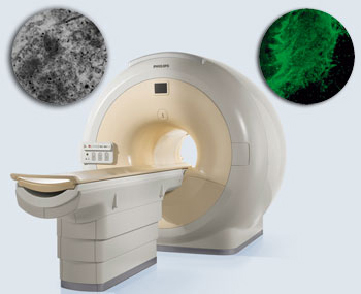Home > Press > Magnetic Nanoparticles Could Be Used To Track How Neural Cells Heal Spinal Injuries
 |
| Stem cells attached to biocompatible nanoparticles can be visualised by MRI after transplantation into spinal cord slices. |
Abstract:
Neural stem cells are a promising treatment for repairing spinal cord injuries as they have the ability to generate tissue, but there is no effective way of monitoring the cells for long periods of time after transplantation.
Magnetic Nanoparticles Could Be Used To Track How Neural Cells Heal Spinal Injuries
London, UK | Posted on February 24th, 2011Nguyen TK Thanh at the Davy Faraday Research Laboratory, University College London, LCN and the Royal Institution, and colleagues, believe they have the answer. They have developed hollow biocompatible cobalt-platinum nanoparticles and attached them to the stem cells. The nanoparticles are stable for months and have a high magnetic moment - tendency to align with a magnetic field - so that low concentrations can be detected using magnetic resonance imaging (MRI).
'Magnetic nanoparticles are emerging as novel contrast and tracking agents in medical imaging,' says Samir Pal at the California Institute of Technology, US, an expert in biological-nanoparticle interactions. 'When used as a contrast agent for MRI, the nanoparticles allow researchers and clinicians to enhance the tissue contrast of an area of interest by increasing the relaxation rate of water.'
The team labelled stem cells with their nanoparticles, injected them into spinal cord slices and took images of their progress over time. They found that low numbers of the nanoparticle-loaded stem cells could still be detected two weeks after transplantation. 'The new method demonstrates the feasibility of reliable, noninvasive MRI imaging of nanoparticle-labelled cells,' says Thanh.
Thanh hopes that her stem cell tracking method will be used during stem cell replacement therapy for many central nervous system diseases. Her team is working towards developing nanoparticles that can be used to diagnose and treat these diseases.
Harriet Brewerton
####
About London Centre for Nanotechnology
The London Centre for Nanotechnology is a UK-based multidisciplinary enterprise operating at the forefront of science and technology. Our purpose is to solve global problems in information processing, healthcare, energy and environment through the application of nanoscience and nanotechnology. Founded in 2003, the LCN is a joint venture between University College London and Imperial College London and based at the Bloomsbury and South Kensington sites.
For more information, please click here
Contacts:
London Centre for Nanotechnology
17-19 Gordon Street
London WC1H 0AH
tel: +44 (0)20 7679 0604
fax: +44 (0)20 7679 0595
email:
Copyright © London Centre for Nanotechnology
If you have a comment, please Contact us.Issuers of news releases, not 7th Wave, Inc. or Nanotechnology Now, are solely responsible for the accuracy of the content.
| Related Links |
![]() Magnetic CoPt nanoparticles as MRI contrast agent for transplanted neural stem cells detection
Magnetic CoPt nanoparticles as MRI contrast agent for transplanted neural stem cells detection
| Related News Press |
News and information
![]() Researchers develop molecular qubits that communicate at telecom frequencies October 3rd, 2025
Researchers develop molecular qubits that communicate at telecom frequencies October 3rd, 2025
![]() Next-generation quantum communication October 3rd, 2025
Next-generation quantum communication October 3rd, 2025
![]() "Nanoreactor" cage uses visible light for catalytic and ultra-selective cross-cycloadditions October 3rd, 2025
"Nanoreactor" cage uses visible light for catalytic and ultra-selective cross-cycloadditions October 3rd, 2025
Imaging
![]() ICFO researchers overcome long-standing bottleneck in single photon detection with twisted 2D materials August 8th, 2025
ICFO researchers overcome long-standing bottleneck in single photon detection with twisted 2D materials August 8th, 2025
![]() Simple algorithm paired with standard imaging tool could predict failure in lithium metal batteries August 8th, 2025
Simple algorithm paired with standard imaging tool could predict failure in lithium metal batteries August 8th, 2025
![]() First real-time observation of two-dimensional melting process: Researchers at Mainz University unveil new insights into magnetic vortex structures August 8th, 2025
First real-time observation of two-dimensional melting process: Researchers at Mainz University unveil new insights into magnetic vortex structures August 8th, 2025
![]() New imaging approach transforms study of bacterial biofilms August 8th, 2025
New imaging approach transforms study of bacterial biofilms August 8th, 2025
Nanomedicine
![]() New molecular technology targets tumors and simultaneously silences two ‘undruggable’ cancer genes August 8th, 2025
New molecular technology targets tumors and simultaneously silences two ‘undruggable’ cancer genes August 8th, 2025
![]() New imaging approach transforms study of bacterial biofilms August 8th, 2025
New imaging approach transforms study of bacterial biofilms August 8th, 2025
![]() Cambridge chemists discover simple way to build bigger molecules – one carbon at a time June 6th, 2025
Cambridge chemists discover simple way to build bigger molecules – one carbon at a time June 6th, 2025
![]() Electrifying results shed light on graphene foam as a potential material for lab grown cartilage June 6th, 2025
Electrifying results shed light on graphene foam as a potential material for lab grown cartilage June 6th, 2025
Announcements
![]() Rice membrane extracts lithium from brines with greater speed, less waste October 3rd, 2025
Rice membrane extracts lithium from brines with greater speed, less waste October 3rd, 2025
![]() Researchers develop molecular qubits that communicate at telecom frequencies October 3rd, 2025
Researchers develop molecular qubits that communicate at telecom frequencies October 3rd, 2025
![]() Next-generation quantum communication October 3rd, 2025
Next-generation quantum communication October 3rd, 2025
![]() "Nanoreactor" cage uses visible light for catalytic and ultra-selective cross-cycloadditions October 3rd, 2025
"Nanoreactor" cage uses visible light for catalytic and ultra-selective cross-cycloadditions October 3rd, 2025
|
|
||
|
|
||
| The latest news from around the world, FREE | ||
|
|
||
|
|
||
| Premium Products | ||
|
|
||
|
Only the news you want to read!
Learn More |
||
|
|
||
|
Full-service, expert consulting
Learn More |
||
|
|
||








